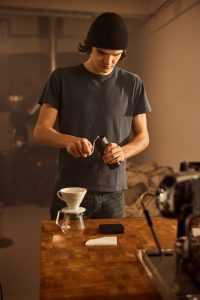MILAN – Luka is the founder of the Slovenian micro roastery Banibeans, a reality born of a rather precocious passion: the love for this quality and sustainable raw material was born when he was just 16 years old, and from there, it was nothing but a walk down the specialty road.
You thought of having your own specialty brand already at 16, so the question arises: in Slovenia, was the specialty already so well known that it was popular among the very young, or did you approach this world on your own initiative?
“Yes it is true that i started working with specialty coffee when i was very young (age of 16/17) but specialty coffee in Slovenia was already present at that time. There were 2 or 3 coffee shops or roasteries who were offering specialty coffee (Stow, Cafe Čokl, Moderna galerija).”
By the time you were 17, you had already created Banibeans: why roasting and not some other profession always in contact with specialty?
“I started with Banibeans because i wanted to offer people really light roasted coffee. My idea was that we have a lot of good baristas in Slovenia, but it is very hard to find coffee that will be light.
So I wanted to create a brand which will be known for light roast. So whenever customers see Banibeans they can be sure coffee is roasted light. I also thought that roasting is the most important thing in coffee, but I have changed my opinion in the last few years. ”
Why did you decide to roast filter coffee in particular? Is it just a preference of yours or is it because filter coffee is consumed more in Slovenia?
” I decided to roast light/for filter because i think coffee keeps all naturals flavours and characteristics when it is roasted that way. You can taste where does coffee come from, which variety it is.
And on the other hand when brewing coffee as filter, coffee is very delicate and not so harsh.”
Also working with Italy, with the support of PizziCoffee can your coffee also be used for espresso without losing its best characteristics?
“Yes I always explain to baristas or customers that my coffee is roasted for filter but that does not mean that it is not good as espresso. Some coffees are also good as espresso, some not. But if you like fresh and juicy espresso, i think you can make a delicious espresso with my beans.”
What is the biggest difficulty of doing specialty in Slovenia?
” The most difficult thing is to convince people that filter coffee is also coffee. Most of the people think that coffee=espresso, but it is simply not like that. Coffee can be prepared in many ways and not one is ”the correct one”.
Also there is a huge problem that Slovenia is quite old in terms of population. It is way easier to introduce specialty coffee to younger generations so there is not so many people interested in specialty coffee.”
How many specialty coffee shops are there in Slovenia today and how many micro roasteries?
“I think there are 5 or 6 shops in Ljubljana and 2 in Maribor. We have 8 specialty coffee roasteries in Slovenia.”

Is the price of specialty coffee a problem for Slovenian consumers?
“Yes, the price is a big problem, because it is hard to convince someone to pay 2.5 euro for espresso instead of 1.5 euro.
It is necessary to put yourself in the shoes of the average consumer who has not yet been introduced to speciality coffee. We quickly realise that price is one of the main barriers to getting to know this type of coffee. That is why roasters also need to make their prices more attractive.”
What is your target market? Only Slovenia or also other countries?
“When i started with Banibeans i had an idea that it will be brand only available in Slovenia. But in the last few months there has been huge enquiry from other parts of Europe. That is why i started selling across all EU and i have also shipped few packages to USA.”
Do you have a direct relationship with growers?
“I try to have as many direct relationship with farmers as possible. In some cases/countries, this relationship is established through an importer in Europe who arranges for farmers to visit roasters in Europe a few times a year, and in some cases you meet them quite by chance.
At a coffee fair in Italy (Milan) a year ago, I met some of the growers I work with. What stuck with me the most was the smile of a grower from Rwanda who spotted his coffee on my stand. A really nice experience.”
How many kilos per month approximately and through which channels do you manage to sell them (horeca, online)?
” The average amount of coffee I roast is about 200kg per month. Most of the sales come from the online shop, but some also through partners/coffee shops in Europe.”
What are today’s consumption habits and new trends in Slovenia?
“The awareness of specialty coffee in Slovenia is improving year by year. This is also noticeable in the number of customers who often order coffee through my online shop. However, most Slovenians still prefer dark roast coffee at home.”
Which roaster model do you work with?
“I currently roast on a 3kg gas roaster, but I am planning to buy a new/larger one soon, which would allow me to offer my coffee to an even wider range of people.”
Now, after a few years in business, can you already take stock of Banibeans and look forward to the near future?
“In the future, my main ambition is to convince/educate as many consumers as possible about what specialty coffee is. I would still stick to light roasting, but within two/three years I would also like to have a small and boutique coffee shop in Ljubljana.”
















